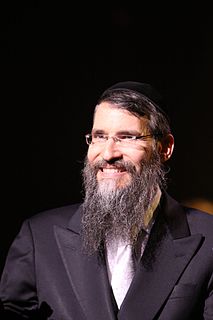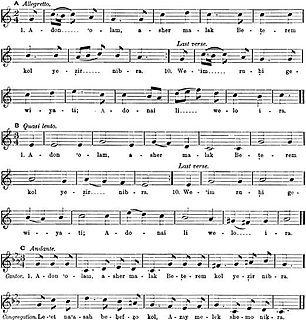Related Research Articles
A siddur is a Jewish prayer book, containing a set order of daily prayers. The word siddur comes from the Hebrew root ס־ד־ר meaning "order".

The Haggadah is a Jewish text that sets forth the order of the Passover Seder. Reading the Haggadah at the Seder table is a fulfillment of the mitzvah to each Jew to "tell your son" of the Jewish liberation from slavery in Egypt as described in the Book of Exodus in the Torah.

Amram Gaon was a famous Gaon or head of the Jewish Talmud Academy of Sura during the 9th century. He authored many Responsa, but his chief work was liturgical.

Dayenu is a song that is part of the Jewish holiday of Passover. The word "dayenu" means approximately "it would have been enough", "it would have been sufficient", or "it would have sufficed". This traditional up-beat Passover song is over one thousand years old. The earliest full text of the song occurs in the first medieval haggadah, which is part of the ninth-century Seder Rav Amram. The song is about being grateful to God for all of the gifts he gave the Jewish people, such as taking them out of slavery, giving them the Torah and Shabbat, and had God only given one of the gifts, it would have still been enough. This is to show much greater appreciation for all of them as a whole. The song appears in the haggadah after the telling of the story of the exodus and just before the explanation of Passover, matzah, and the maror.

Deborah Lynn "Debbie" Friedman was an American singer-songwriter of Jewish religious songs and melodies. She was born in Utica, New York, but moved with her family to Minnesota at age 6. She is best known for her setting of "Mi Shebeirach", the prayer for healing, which is used by hundreds of congregations across America. Her songs are used by some Orthodox Jewish congregations, as well as non-Orthodox Jewish congregations. Friedman was a feminist, and Orthodox Jewish feminist Blu Greenberg noted that while Friedman's music impacted most on Reform and Conservative liturgy, "she had a large impact [in] Modern Orthodox shuls, women’s tefillah [prayer], the Orthodox feminist circles.... She was a religious bard and angel for the entire community."

Avraham Shabsi Hakohen Friedman better known by his stage name, Avraham Fried, is a popular musical entertainer in the Orthodox Jewish community.
Michael Isaacson is a composer of Jewish synagogue music, and one of the originators of the Jewish camp song movement. His camp songs, often written and premiered in the same day, defined the camp music movement in the 1960s, and have been cited as influences by modern Jewish pop stars such as Debbie Friedman and Craig Taubman.

Adon Olam is a strictly metrical hymn in the Jewish liturgy written in lines of eight syllables; more precisely, each line is composed of two segments of one yated and 2 tenu'ot, which indeed makes 8 syllables. It has been a regular part of the daily and Shabbat (Sabbath) liturgy since the 15th century.
Passover songs are songs from the seder, the festive meal associated with the Jewish festival of Passover.
For the purposes of this article, “contemporary” refers to the period from 1967 to the present day, “Jewish” refers to the various streams and traits of Judaism practiced. Many Orthodox Jews use the term “religious” to refer to a strict adherence to Jewish law. For the purposes of this article, “religious” refers to the content and context of the music itself: liturgical or implicit references to the divine.
This article describes the principal types of religious Jewish music from the days of the Temple to modern times.
Nishmat is a Jewish prayer that is recited following the Song of the Sea during Pesukei D'Zimrah but before Yishtabach on Shabbat and Yom Tov. It is also recited during the Passover seder in some traditions. It is prized by halakhic authorities because the concepts covered in this prayer are basic to halakha.
Shalom Rav is a blessing that is recited at the end of the evening Amidah in the Ashkenazic tradition. There is a different version of this prayer, Sim Shalom, for the morning Amidah. In the Sefardic, Chasidic-Sefardic, and Nusach Ari rites, Sim Shalom is said at all prayer services.
Nusach Ashkenaz is a style of Jewish religious service conducted by Ashkenazi Jews, originating from Central and Western Europe.
Shalom Aleichem is a traditional song sung by Jews every Friday night upon returning home from synagogue prayer. It signals the arrival of the Jewish Sabbath, welcoming the angels who accompany a person home on the eve of the Sabbath.
The Milken Archive of Jewish Music is a collection of material about the history of Jewish Music in the United States. It contains roughly 700 recorded musical works, 800 hours of oral histories, 50,000 photographs and historical documents, an extensive collection of program notes and essays, and thousands of hours of video footage documenting recording sessions, interviews, and live performances.

Benzion Hakohen "Benny" Friedman is an American Hasidic Jewish singer. Professionally trained in voice, he rose to prominence on the contemporary Jewish religious music scene with his first album in 2009. His biggest hit to date is the song "ivri anochi", which has been covered by numerous Jewish musical artists. Singing mainly in Hebrew, Friedman tours extensively and also appears in music videos. He views his music as a shlichus (outreach) tool, with the goal of drawing Jews closer to Judaism.
L'Shana Haba'ah B'Yerushalayim, lit. "Next year in Jerusalem", is a phrase that is often sung at the end of the Passover Seder and at the end of the Ne'ila service on Yom Kippur. Its use during Passover was first recorded by Isaac Tyrnau in his 15th century CE book cataloging the Minhaggim of various Ashkenazi communities.

Olin Sang Ruby Union Institute (OSRUI) is a Jewish overnight summer camp and conference center located Oconomowoc, Wisconsin. The camp attracts over 1,000 children each summer, mainly from the United States and Canada. It serves children in second through twelfth grades in a variety of programs, including specialized arts and Hebrew language units.
References
- ↑ "Remembering and Celebrating Debbie Friedman"
- ↑ Judah Cohen, LINER NOTES FROM SNAPSHOTS: THE BEST OF KOL B’SEDER
- ↑ http://www.kolbseder.com/pr.html
- ↑ Jim Ball, "Musical Settings: Shalom Rav"
- ↑ "Jeff Klepper Bio"